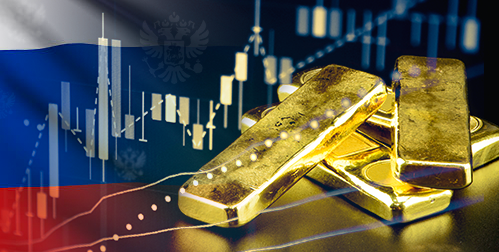Russia Stockpiles Gold
Russian banks are finding themselves stranded atop a mountain of gold. They expanded their gold reserves almost sixfold since the mid-2000s. Russia now holds the world’s fifth largest gold stockpile. Their reserves are estimated to be at 2,300 tons and worth nearly $140 billion. They had stopped buying after the start of the pandemic when prices spiked.1
The huge reserves of the precious metal were built up over the past decade and a half. Russia increased their gold purchases when the U.S. sanctioned them for invading Crimea in 2014. Gold was intended to be an economic insurance policy for the country. Russia wanted an asset it could sell to shore up the ruble.
But that strategy is failing in the face of sanctions. The ruble has plunged as global economies isolate Russia. “This is why they bought their gold, it was for a situation just like this,” said Fergal O’Connor, a lecturer at Cork University Business School. “But if no one will trade it with you, it doesn’t matter.”2
Sanctions
Sanctions forbid U.S., U.K. and European Union institutions from doing business with Russia’s central bank. Traders and banks don’t want to buy the country’s gold indirectly out of fear of being penalized.
Senators in Washington are proposing secondary sanctions on anyone buying or selling Russian gold. Their goal is to stop China and India from buying or lending against Russia’s bullion.
The US Senate followed that move with a new bill that would prohibit US citizens from making any transaction that involves Russian gold.
“Russia’s massive gold supply is one of the few remaining assets that Putin can use to keep his country’s economy from falling even further,” Maine Sen. Angus King said in a statement. “By sanctioning these reserves, we will further isolate Russia from the world’s economy and increase the difficulty of Putin’s increasingly-costly military campaign.”3
Last week, London’s gold marketplace — the most important center in the world for bullion — banned all bars from Russian refineries. This effectively shutting it out of the global trade.
The central bank of Russia says domestic demand for gold is high. People are racing to exchange the crashing ruble for gold bars. Therefore, the bank said it will stop buying gold so as not to compete with citizens. If the ruble continues to free fall relative to the US dollar, Russia may peg its currency to gold. Essentially, using its stockpile to return to an internal gold-standard.
Effect on Gold Prices
Sanctions will definitely affect the price of gold. Prices are already on the rise as fighting in Ukraine boosted demand for safe-haven assets. Spot gold rose 0.67 % to $1,934.08 per ounce.4
Fueled by inflation fears, demand for gold is at record levels. Sanctions will remove Russia’s massive gold stockpiles from the market. Limiting supply in the face of growing demand will most likely result in even higher prices for gold.
This is the most opportune time to get into a Gold IRA and secure your long-term investments. To find out more, simply contact American Hartford Gold.






